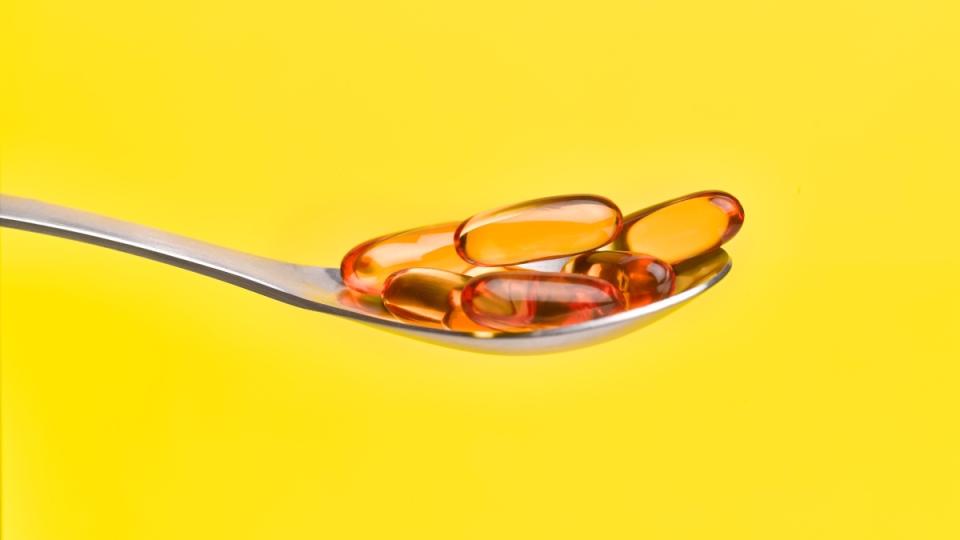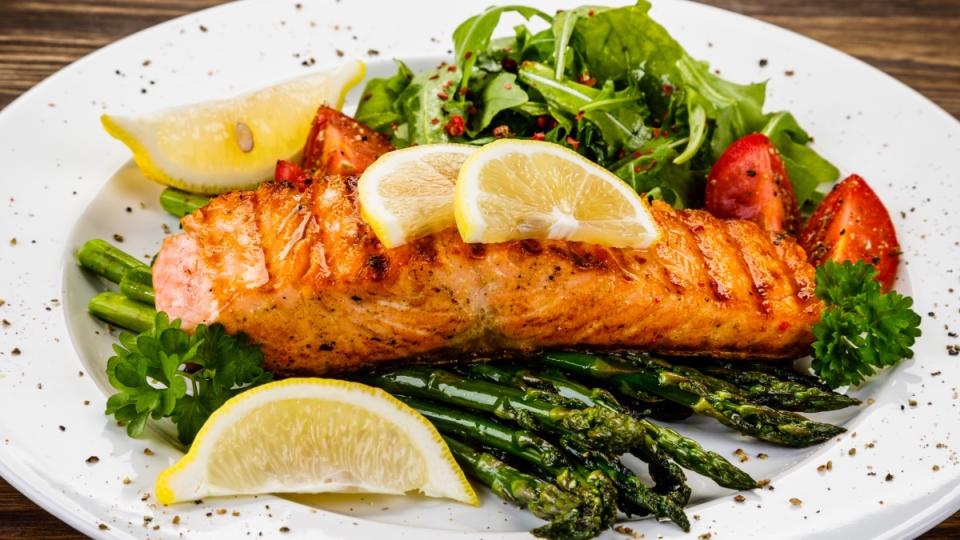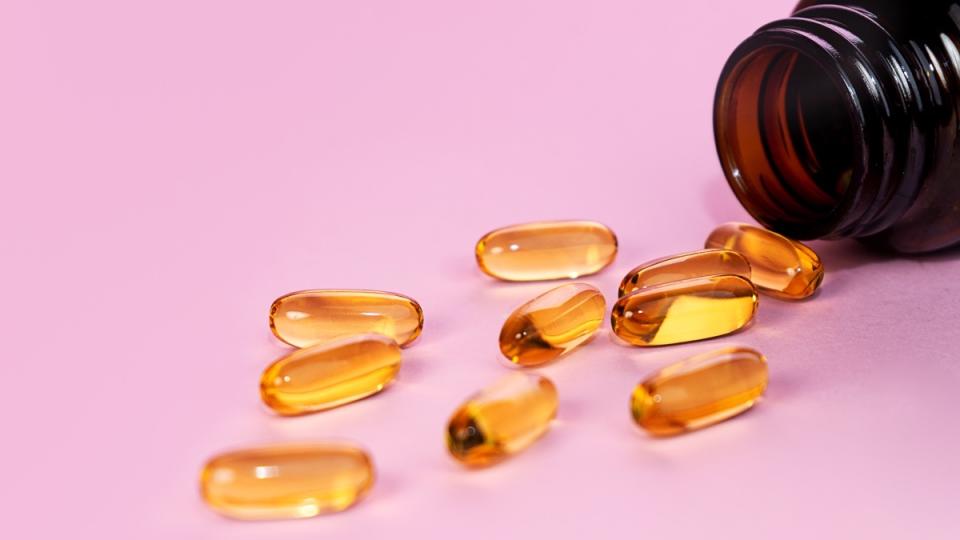Harvard Doctor Says This Much Omega 3 per Day Is Essential for Good Health — Here’s How To Get It
If you looked in your medicine cabinet 10 or 20 years ago, you would have seen a prescription or two and maybe some over-the-counter pain medication. But now, it’s easy to fill an entire medicine cabinet — or more — with vitamins and supplements. But do we really need to be taking all of them? One that experts agree is worth keeping on hand is omega 3 fatty acids. Here, discover why omega 3s are so important to staying healthy and vibrant, plus how much omega 3 per day you need and how to get it.
What are omega 3s?
“Omega 3s are polyunsaturated fatty acids that are overall essential for good health,” says Joann Manson, MD, MPH, the Chief of the Division of Preventive Medicine at Brigham and Women’s Hospital in Boston and a Professor of Medicine at Harvard Medical School. “There are several kinds.” The two primary forms of omega 3s most useful to the body are eicosapentaenoic acid (EPA) and docosahexaenoic acid (DHA), which are marine omega 3s found in fish. There's also alpha-linoleic acid (ALA), which is found in plant-based foods.
“EPA and DHA are the most biologically active,” explains Evelina Grayver, MD, the Director of the Women’s Heart Program at the Katz Institute for Women’s Health, Northwell Health’s Central Region, and an Assistant Professor of Cardiology at the Donald and Barbara Zucker School of Medicine at Hofstra/Northwell. “Our bodies cannot produce their own omega 3s, so it’s incredibly important that these healthy fats are consumed through diet and supplementation.” (Learn how omega 3s help balance hormones to tame menopause symptoms.)

How omega 3s impact health
Omega 3s can bolster everything from your bones to your brain. Here's a quick look at what the beneficial fatty acids can do:
1. They protect the heart
As a director of the VITamin D and OmegA-3 TriaL (VITAL) that looked at the influence of omega 3s on heart health, Dr. Manson found that people who increased their omega 3 intake saw a 20% reduction in major cardiovascular events such as heart attack and stroke. “There are several possible mechanisms,” she explains. “One is that omega 3s lower triglyceride levels, but that usually requires high doses. They also make the blood less likely to clot and stabilize the electrical rhythms of the heart.”
Related: How to Prevent Heart Disease: These 5 MD-Backed Shortcuts Are Too Easy Not to Try
2. They power the brain
“The brain is all fat, it’s the fattiest organ in the body,” Dr. Grayver reveals. “DHA in particular makes up a large percentage of the omega 3s in the brain and is truly one of the most important to support brain health.” Indeed, a review in Cureus found that ingestion of omega 3 fatty acids improved learning, memory, cognitive well-being and blood flow to the brain. (Learn more ways to improve your memory.)
3. They ward off osteoporosis
This is especially true for women going through menopause, notes Dr. Grayver. “During menopause, we have a significant drop in estrogen levels. That means we’re more susceptible to osteoporosis if bone health has not been maintained,” she explains. “Proinflammatory cytokines are responsible for resorption or breakdown of bones. Omegas target those inflammatory markers and decrease the breakdown of bones for women losing that protection.”
The proof: A study in The American Journal of Clinical Nutrition found that daily omega 3 consumption in midlife was associated with a 25% decrease in fracture risk. (See more easy tricks that ward off osteoporosis).

4. They fight inflammation
“Omegas are a very potent anti-inflammatory,” Dr. Grayver says, which is one of the reason they're so beneficial for heart health and some chronic conditions. “In our trial, we saw a benefit for fighting autoimmune diseases, which women are much more susceptible to than men,” adds Dr. Manson. This anti-inflammatory power is also likely the reason that omega 3s helps ease painful menstrual periods, too.
How much omega 3 per day do you need?
“For healthy adults it’s recommended to have between 250 and 500 mg a day,” says Dr. Manson. “That amounts to about 1 to 2 servings of fish per week, depending on the type of fish" (more on that below). This amount can vary depending on your age and health. “For people with a history of heart disease, the American Heart Association recommends 1 gram [or 1,000 mg] a day,” Dr. Manson adds, noting that up to 4,000 mg has been studied for heart health.
Women may need different amounts depending on their age and stage of life as well. “For perimenopause and menopause, I recommend 2,000 to 4,000 mg of combined EPA and DHA," advises Dr. Grayver. "For pregnant women, it’s recommended to take 650 mg per day of combined EPA and DHA, and at least 300 mg has to be DHA." (Learn more about omega 3-rich krill oil vs fish oil.)
Foods high in omega 3
“Most diets are sorely lacking in these fats, despite them being essential to every area of human health,” notes Dr. Grayver. However, it is possible to get enough omega 3 fatty acids each day from your diet if you're eating the right foods.
Note: While the concentrations of ALA in foods are much higher than those of EPA and DHA, the body only converts a small percentage (around 5%) of ALA to the EPA and DHA that it actually needs.
Here are the top food sources of omega 3s:
Foods highest in EPA and DHA omega 3
Salmon: 1,830 mg combined EPA and DHA per 3-oz. serving
Herring: 1,710 mg combined EPA and DHA per 3-oz. serving
Sardines: 1,190 mg combined EPA and DHA per 3-oz. serving
Mackerel: 1,020 mg combined EPA and DHA per 3-oz. serving
Trout: 840 mg combined EPA and DHA per 3-oz. serving

Foods highest in ALA omega 3
Flaxseed oil: 7,260 mg per 1-Tbs. serving
Chia seeds: 5,060 mg per 1-oz. serving
English walnuts: 2,570 mg per 1-oz. serving
Flaxseeds: 2,350 mg per 1-Tbs. serving
Canola oil: 1,280 mg per 1-Tbs. serving
The best omega 3 supplement
Experts agree that while aiming for a healthy diet rich in omega 3s is ideal, supplements are a perfectly acceptable way to ensure you’re getting enough of these essential fatty acids. Not sure exactly what you need?
“I would look for a combination of at least 750 to 800 mg of EPA plus DHA,” suggests Dr. Manson. For maximum heart health benefits, she recommends a supplement with at least as much EPA as DHA, if not up to a 1.2 to 1 ratio of EPA to DHA.
While omega 3 amounts up to 4,000 mg have been studied safely, Dr. Manson cautions against going overboard. “Taking very high doses could lead to an increased risk of bleeding and also atrial fibrillation,” she says. “Don’t mega dose unless under the supervision of a doctor.”

Tip: The source of the omega 3s is less important than the concentrations of the fatty acids themselves. “I despise the aftertaste of fish, so I’m very sensitive to my patients who say that,” says Dr. Grayver, who encourages finding the one you can comfortably take on a daily basis. That said, stick to DHA and EPA in supplements (not ALA), as these are the type of omega 3 your body can most readily use.
Finally, Dr. Manson recommends only taking a supplement that has a seal of quality control auditing from an organization like US Pharmacopeia (USP), NSF or Consumer Labs.
Two options the fit the bill
Supplements that match Dr. Manson and Dr. Grayver's guidelines include Viva Naturals Triple Strength Omega 3 Fish Oil, which has 2,500 mg of combined EPA and DHA, and Nordic Naturals Algae Omega, which has 715 mg of combined EPA and DHA from algal oil (which means no fishy aftertaste).
For more vitamins and nutrients that can boost your health:
Experts Reveal the Best Vitamin to Keep Muscles Strong as You Age + How to Get More
This Sneaky Vitamin Deficiency May Be the Cause of Your Thinning Hair — Here’s How to Really Fix It
This content is not a substitute for professional medical advice or diagnosis. Always consult your physician before pursuing any treatment plan.
